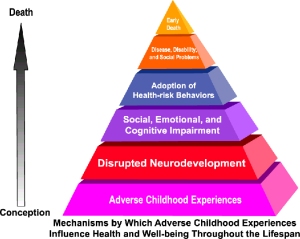 No one questions that health care costs in the United States are out of control. Excessive drug prices, unnecessary medical procedures, and continued reliance on an outdated fee for service treatment model, are frequently discussed reasons for this economic dilemma. Childhood trauma and household dysfunction are seldom cited as possible factors. This oversight limits any viable solution to the problem.
No one questions that health care costs in the United States are out of control. Excessive drug prices, unnecessary medical procedures, and continued reliance on an outdated fee for service treatment model, are frequently discussed reasons for this economic dilemma. Childhood trauma and household dysfunction are seldom cited as possible factors. This oversight limits any viable solution to the problem.
Adverse childhood adversities (ACEs) have serious consequences for both mental and physical health. Depression, anxiety disorders, and reliance on “risky self-soothers” such as smoking, drugs and alcohol are highly correlated with early childhood trauma and adversity. But so are common physical illnesses such as Type 2 diabetes, cardiovascular disease, COPD, and obesity.
Today’s research challenges policy makers, physicians, and insurers to view the drivers of health care costs through a more trauma sensitive lens. Pediatricians, “well baby” clinicians, and school nurses need to be alert to the level of stress or household dysfunction their patients are exposed to. They can then link families to needed services and supports. Adult health care programs need to integrate strategies for managing stress and unresolved childhood maltreatment. These additional supports hold the promise of more effective symptom management than interventions emphasizing cessation or life-style changes alone.
Like so many social problems, lowering health care costs starts with acknowledging the elephant in the living room – in this case, childhood adversity.
Finding Your ACE Score
While you were growing up, during your first 18 years of life:
- Did a parent or other adult in the household often or very often…
Swear at you, insult you, put you down, or humiliate you?
or
Act in a way that made you afraid that you might be physically hurt?
Yes No If yes enter 1 ________
- Did a parent or other adult in the household often or very often…
Push, grab, slap, or throw something at you?
or
Ever hit you so hard that you had marks or were injured?
Yes No If yes enter 1 ________
- Did an adult or person at least 5 years older than you ever…
Touch or fondle you or have you touch their body in a sexual way?
or
Attempt or actually have oral, anal, or vaginal intercourse with you?
Yes No If yes enter 1 ________
- Did you often or very often feel that …
No one in your family loved you or thought you were important or special?
or
Your family didn’t look out for each other, feel close to each other, or support each other?
Yes No If yes enter 1 ________
- Did you often or very often feel that …
You didn’t have enough to eat, had to wear dirty clothes, and had no one to protect you?
or
Your parents were too drunk or high to take care of you or take you to the doctor if you needed
it?
Yes No If yes enter 1 ________
- Were your parents ever separated or divorced?
Yes No If yes enter 1 ________
- Was your mother or stepmother:
Often or very often pushed, grabbed, slapped, or had something thrown at her?
or
Sometimes, often, or very often kicked, bitten, hit with a fist, or hit with something hard?
or
Ever repeatedly hit at least a few minutes or threatened with a gun or knife?
Yes No If yes enter 1 ________
- Did you live with anyone who was a problem drinker or alcoholic or who used street drugs?
Yes No If yes enter 1 ________
- Was a household member depressed or mentally ill, or did a household member attempt suicide?
Yes No If yes enter 1 ________
- Did a household member go to prison?
Yes No If yes enter 1 _______
Now add up your “Yes” answers: _______ This is your ACE Score.
Learn more at:
Childhood Trauma: The Hidden Health Crisis
Karr-Morse, R. & Wiley, M.S. (2012). Scared sick. Basic Books: NYC, NY
Wade R Jr, Cronholm PF, Fein JA, Forke CM, Davis MB, Harkins-Schwarz M, Pachter LM, Bair-Merritt MH.
Child Abuse Negl. 2015 Dec 23. pii: S0145-2134(15)00452-4. doi: 10.1016/j.chiabu.2015.11.021. [Epub ahead of print]
PMID: 26726759
Long Term Physical Health Consequences of Adverse Childhood Experiences.
Monnat SM, Chandler RF.
Sociol Q. 2015 Sep; 56(4):723-752. Epub 2015 Jul 3.
PMID: 2650037 Free PMC Article
Visit my blog at: www.meltdownstomastery.wordpress.com
Trauma-Sensitive Schools: Learning Communities Transforming Children’s Lives (2016) TCP: NYC, NY is available for purchase at www.amazon.com.

I am continually searching online for ideas that can aid me. Thx!